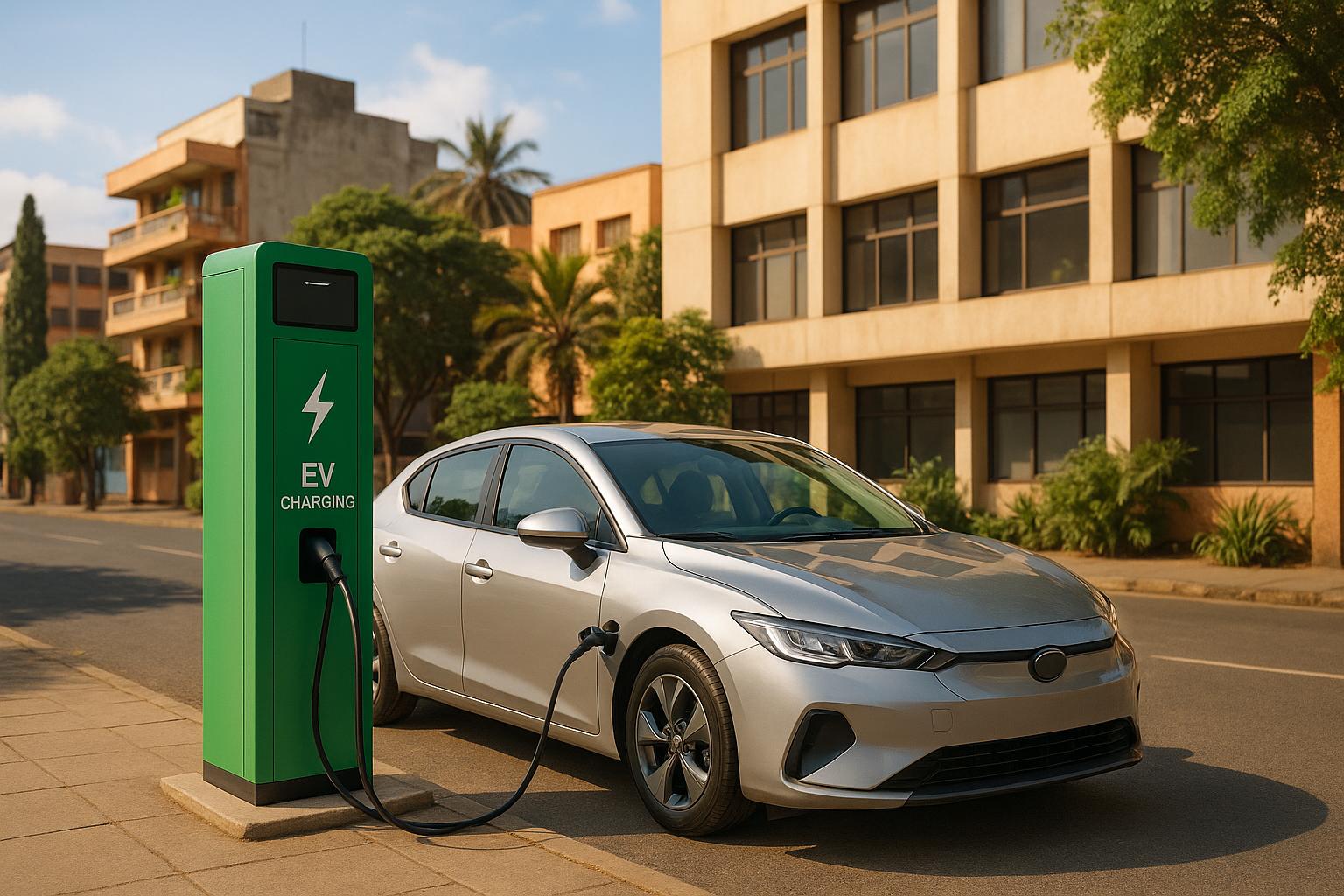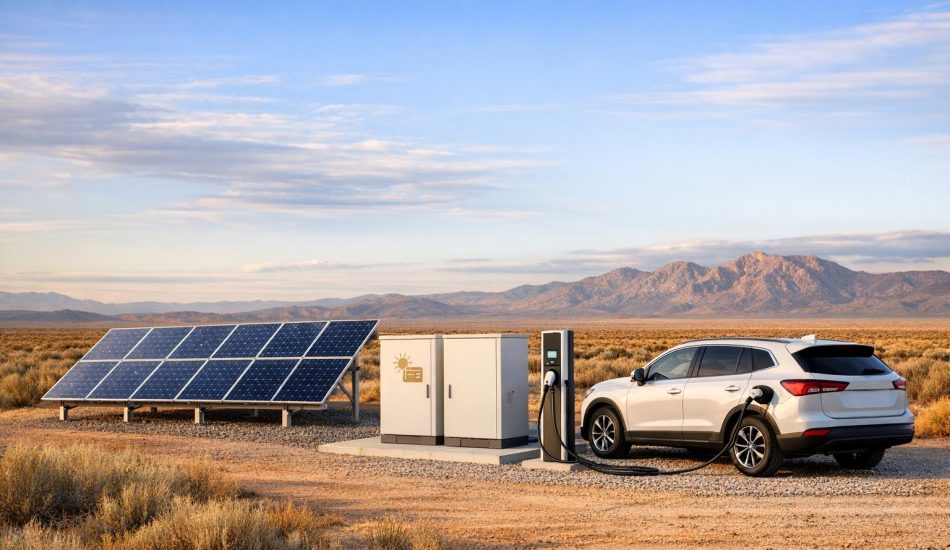
Electric cars are gaining attention in Kenya, but are they the right choice for you? Here’s a quick breakdown:
- The Good: Lower running costs, reduced emissions, government incentives, and smooth driving make EVs appealing, especially in cities.
- The Bad: High purchase prices, limited charging stations, and challenges with Kenya’s terrain and climate can complicate ownership.
If you’re in a city like Nairobi with better charging access, EVs could save you money in the long run. But for rural drivers or those traveling long distances, the current infrastructure might make EVs less practical.
Key takeaway: Consider your driving habits, budget, and access to charging before making the switch.
1. Benefits of Driving an Electric Car in Kenya
Performance
Electric vehicles bring a new level of convenience to city driving. With their instant torque and quick acceleration, they offer a quieter and smoother ride – perfect for navigating through busy, congested streets. This makes them particularly well-suited for urban environments.
Take electric motorcycles, for example. They’re exceptional at weaving through traffic and maneuvering narrow streets, as seen in Kisumu. This demonstrates the growing potential of electric mobility across Kenya.
How practical is having an electric car in Kenya?
2. Drawbacks of Driving an Electric Car in Kenya
Kenya’s push for renewable energy aligns well with the adoption of electric vehicles (EVs). However, several challenges make owning and driving an EV in the country less straightforward.
Cost
The upfront cost of EVs is a significant hurdle. High base prices, coupled with steep import duties, make these vehicles expensive. While EVs generally require less routine maintenance than traditional cars, specialized repairs can be tricky and expensive. Battery replacements, in particular, can lead to hefty bills and long delays.
Infrastructure
Charging infrastructure in Kenya is still in its infancy. Most charging stations are concentrated in urban hubs like Nairobi, leaving rural and long-distance travelers with limited options. This lack of widespread charging points contributes to range anxiety for many potential EV owners.
On top of that, the country’s power grid reliability poses another challenge. Frequent power outages in certain areas can render charging stations useless, even in places where they exist. Home charging setups aren’t always a reliable alternative, as grid issues could leave drivers stranded with an empty battery. The slower and limited charging network also makes planning longer trips a logistical headache.
Performance
Kenya’s unique geography and climate add another layer of complexity for EV owners. Hilly terrain and rough roads can drain EV batteries faster than expected, reducing their range below advertised levels. High temperatures, coastal humidity, and dust can also impact battery efficiency and durability.
Additionally, the design of many EVs prioritizes battery placement, which can limit cargo and passenger space. This makes them less practical for families or businesses that need more room for passengers or goods.
These challenges underscore the ongoing hurdles for EV adoption in Kenya, despite the country’s strides toward renewable energy.
sbb-itb-99e19e3
Pros and Cons
Switching to an electric vehicle (EV) in Kenya comes with both advantages and challenges. The country’s potential for renewable energy and supportive government policies create a favorable environment for EV adoption. However, hurdles like limited charging options and higher upfront costs can’t be ignored. Here’s a side-by-side look at the key pros and cons:
| Pros | Cons |
|---|---|
| Lower Operating Costs – Electricity is often cheaper than gasoline, offering substantial savings on fuel. | High Initial Purchase Price – EVs generally have steeper upfront costs, further inflated by import duties. |
| Cleaner Transportation – EVs produce zero direct emissions, and Kenya’s renewable energy sources make them even more eco-friendly. | Limited Charging Network – Charging stations are mainly found in urban areas like Nairobi, leaving rural areas underserved. |
| Government Support – Initiatives like reduced import duties and tax benefits aim to make EV ownership more appealing. | Range Anxiety – Sparse charging infrastructure can make long-distance travel stressful for EV owners. |
| Lower Maintenance Costs – With fewer moving parts, EVs typically require less servicing and upkeep. | Power Grid Challenges – Frequent power outages can disrupt charging, both at home and at public stations. |
| Quiet and Smooth Operation – EVs offer a quieter, more comfortable driving experience, especially in cities. | Impact of Climate – Kenya’s high temperatures and humidity could reduce battery efficiency over time. |
| Energy Independence – Reducing reliance on imported fuel supports local renewable energy initiatives. | Reduced Storage Space – Battery placement may limit cargo and passenger space compared to traditional vehicles. |
| Instant Acceleration – Electric motors deliver immediate torque, enhancing the driving experience. |
The practicality of owning an EV in Kenya largely depends on your driving habits and location. If you’re based in a city with a reliable charging network, EVs can be a great fit. On the other hand, rural drivers or those covering long distances might face more obstacles.
For those interested, EV24.africa offers a range of models designed to suit local driving conditions.
Conclusion
Choosing to drive an electric car in Kenya largely depends on where you live and your specific driving habits. For residents of major cities like Nairobi, where charging stations are more accessible and daily commutes are relatively predictable, EVs can be a smart investment. They offer potential fuel savings, lower maintenance costs, and environmental advantages – further boosted by government incentives and the increasing use of renewable energy in the country.
However, EVs may not be the best fit for everyone. City dwellers navigating urban roads are likely to find them convenient and cost-effective. But if you frequently travel long distances, live in rural areas with limited charging infrastructure, or have a tight budget, sticking with a traditional car might make more sense for now. While urban drivers stand to gain the most, rural users may face hurdles that make EVs less practical.
Before making the switch, take time to evaluate your driving habits, financial situation, and access to charging facilities. If you’re unsure about fully committing to an EV, a hybrid vehicle could be a good middle ground. Alternatively, waiting for the charging network to expand and prices to become more competitive might be a wise decision.
Platforms like EV24.africa can help you compare different models tailored to Kenyan conditions, making it easier to find a vehicle that suits your lifestyle. Ultimately, the key is to choose a car that aligns with your actual needs rather than simply following trends.
Kenya’s shift toward electric vehicles is on the horizon, but aligning your decision with the current realities on the ground will ensure you make the most of this transition.
FAQs
What should you consider before switching to an electric car in Kenya?
Before making the switch to an electric car in Kenya, it’s essential to carefully consider both the perks and potential hurdles. Here are some key points to keep in mind:
- Upfront cost: Electric vehicles (EVs) tend to have a higher purchase price compared to gasoline-powered cars. This could significantly influence your budget and financial planning.
- Charging options: Kenya’s charging infrastructure is still in its early stages, which means charging stations are not widely available. For longer journeys, you’ll need to think ahead about where and how to recharge your vehicle.
- Import challenges: Bringing EVs into Kenya can come with extra expenses or regulatory requirements, which might impact their overall cost and availability.
While EVs come with benefits like reduced running costs and a smaller environmental footprint, it’s crucial to evaluate whether the current infrastructure and expenses work for your lifestyle and driving habits in Kenya.
How does Kenya’s charging infrastructure impact the feasibility of owning an electric vehicle?
Kenya’s electric vehicle (EV) charging network is still in its infancy, with stations currently found in only a few counties. This limited coverage can make things tricky for EV owners, particularly when it comes to long road trips or for those living far from existing charging points.
That said, there’s progress on the horizon. Both private companies and public initiatives are working to expand the network, aiming to make EV ownership more practical across the country. In the meantime, anyone thinking about getting an EV should take a close look at the availability of charging facilities in their area and plan their routes wisely to avoid any hiccups on the road.
What incentives does the Kenyan government offer for electric vehicle owners, and how do they affect costs?
The Kenyan government has introduced several measures to make electric vehicles (EVs) more affordable and appealing to its citizens. Among these are 0% excise duty, reduced import duties, and VAT exemptions on EV imports. To further boost local manufacturing, the first 100,000 EVs produced within Kenya are completely tax-exempt.
By cutting these costs, the government aims to lower the initial expense of owning an EV, making them a more viable option for many. When combined with the lower operating costs and environmental advantages of EVs, these policies are designed to pave the way for broader adoption of electric mobility across the country.




